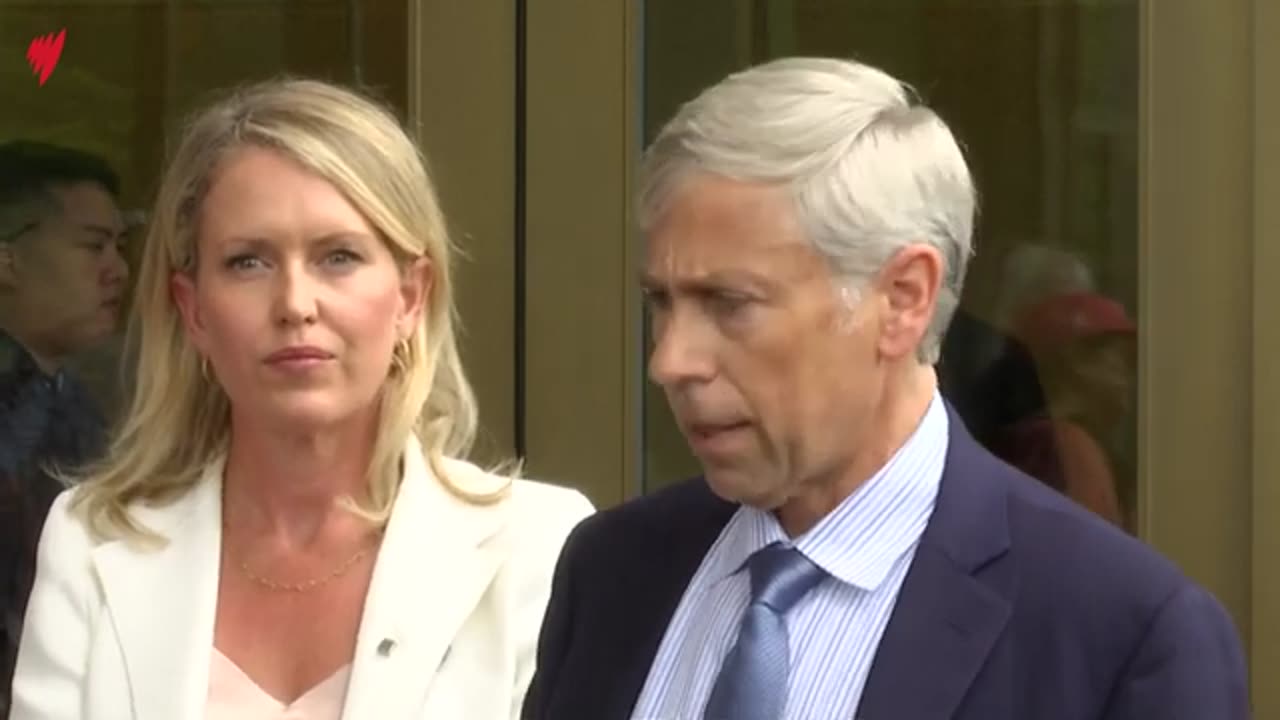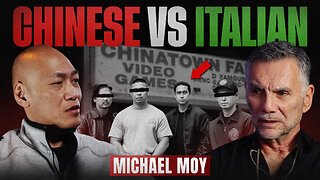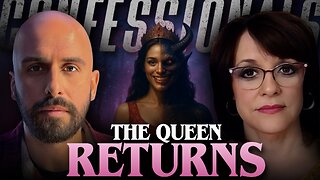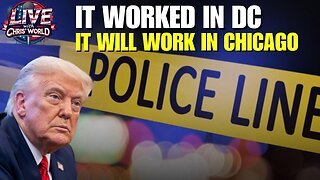Premium Only Content

Julian Assange's lawyers speak outside US court in Saipan SBS News
https://www.youtube.com/watch?v=unu1QcaszVY
I'm Barry Pollack, a criminal defense lawyer for Julian Assange. The prosecution of Julian Assange is unprecedented. In the hundred years of the Espionage Act, it has never been used by the United States to pursue a publisher, a journalist, like Mr. Assange. Mr. Assange revealed truthful, important, and newsworthy information, including revealing that the United States had committed war crimes, and he has suffered tremendously in his fight for free speech, for freedom of the press, and to ensure that the American public and the world community gets truthful and important newsworthy information. We firmly believe that Mr. Assange never should have been charged under the Espionage Act and engaged in an exercise that journalists engage in every day, and we're thankful that they do. It is appropriate, though, for this fight to end, and it is appropriate for the judge, as she did today, to determine that no additional incarceration of Mr. Assange would be fair, would be appropriate, and it is time for him to be reunited with his family. Mr. Assange is grateful for all of the support that he has received and looks forward to reuniting with his wife and his children and getting back home to Australia. Thank you. Mr. Assange will not be taking statements when we conclude here. We'll go back inside and we'll leave with Mr. Assange, but he will not be taking questions. WikiLeaks' work will continue, and Mr. Assange, I have no doubt, will be a continuing force for freedom of the speech and transparency in government. He is a powerful voice and a voice that cannot and should not be silenced. Because his supposed crime occurred entirely outside of the United States, whatever district is the first district that he enters is the appropriate district for him to be prosecuted. By agreement with the government, we decided that this was an appropriate venue. It is closest to Australia. It allowed us to come in, allowed Mr. Assange to walk out a free man, and to quickly get back to his family in Australia. What sends a chilling precedent is the prosecution, the fact that the United States elected to charge Mr. Assange with violating the Espionage Act. The court today determined that no harm was caused by Mr. Assange's publications. We know that they were newsworthy. We know that they were quoted by every major media outlet on the planet, and we know that they revealed important information. That is called journalism. The United States prosecuted that. They exposed Mr. Assange to 175 years in prison. That is what has a chilling effect. To make, today, a decision that it's time for Mr. Assange to go home, that doesn't have a chilling effect. The chilling effect is the United States pursuing journalism as a crime. I hope this is the first and last time that ever occurs. You know what, you just said how difficult was it for Mr. Assange to come here and make this deal? Of course he wants to go home. How difficult was it for him to swallow that? Mr. Assange was not going to agree to any disposition of this case that required him to accept allegations that are simply not true. Mr. Assange did not plead guilty to, and would not plead guilty to, 17 counts of the Espionage Act, computer hacking. There was a very narrow agree-upon set of facts here, and Mr. Assange acknowledges that of course he accepted documents from Chelsea Manning, and published many of those documents because it was in the world's interest that those documents be published. Unfortunately, that violates the terms of the Espionage Act. That's what we acknowledged today. We also said, Mr. Assange said very clearly, that he believes there should be First Amendment protection for that conduct. But the fact of the matter is, as written, the Espionage Act does not have a defense for the First Amendment. So what he acknowledged is what he has to acknowledge, which is true, and nothing that he should be ashamed of. Yes, he received classified information from Chelsea Manning, and he published that information. That should not be a crime. But does he feel that the legacy that he's leaving behind, the legacy that he's made and built in the last 20 years, should actually still be here? I hope he feels very good about it. He has, I think, spurred an important discussion in the United States about how to balance national security and freedom of the press. He has standed by his principles, putting up with detention in the embassy, incarceration in high-security prison. I hope that every one of us would have the courage to stand by our ideals the way Mr. Assange has. And so I certainly hope he feels that he has left a powerful legacy. And I'm certain that there are other chapters in the Julian Assange story yet to be written. With that, I'm going to turn it over to- How long has Julian Assange been here? Years? Months? 62 months in Belmarsh to get this deal. I'm going to turn it over to Jennifer Robinson, Mr. Assange's Australian and United Kingdom counsel. Good morning, everyone. My name's Jen Robinson. I'm Julian Assange's counsel. I've been his longest-serving counsel. Today is a historic day. It brings to an end 14 years of legal battles. And finally, after 14 years of legal battles, Julian Assange can go home a free man. This also brings to an end a case which has been recognised as the greatest threat to the First Amendment in the 21st century. So it is a huge relief to Julian Assange, to his family, to his friends, to his supporters, and to us, and to everyone who believes in free speech around the world, that he can now return home to Australia and be reunited with his family. I want to take this opportunity to thank the many people who have around the world supported Julian Assange over these years and who have supported us in defending him. There has been a global movement behind Julian to protect free speech, and it is because of that global movement of support that today's outcome is possible. I also want to take time to thank the Australian people and the Australian government for all of the support that we've received from home in Australia. In particular, I want to thank our Prime Minister, Anthony Albanese, for his statesmanship, his principled leadership, and his diplomacy, which made this outcome possible. It was as leader of the opposition, he said, and took a stand for justice and said, enough is enough. There is nothing to be served by Julian's continued incarceration. As Prime Minister, he stood true to his word, and he did what he needed to do to ensure Julian's freedom. He raised it at the highest level, at every opportunity, and when Australian officials were making outreach to the US, they knew that they were acting with the full authority of the Prime Minister of Australia. It was his intention that this be done, and we wouldn't be here today without the Prime Minister of Australia's support. So I want to thank Prime Minister Anthony Albanese. I also want to thank our Attorney-General, Mark Dreyfuss, our Foreign Minister, Penny Wong, and give particular thanks to our US Ambassador and former Prime Minister, Kevin Rudd, for his adept diplomacy and his relentless efforts in Washington that facilitated our negotiations with the US government and ensured this outcome. I also want to thank our High Commissioner in London, Stephen Smith, whose tireless work enabled us all to be here today. I think it's also important that we recognise the free speech implications of this case. Julian has suffered for more than 14 years because of the risk of extradition to the United States. He faced 175 years in prison for publishing evidence of war crimes, human rights abuse, and US wrongdoing around the world. Today, he pleaded guilty to an offence for having published information in the public interest for which he's won journalism awards the world over and been nominated for the Nobel Peace Prize every year for the past decade. This sets a dangerous precedent. This prosecution sets a dangerous precedent that should be of concern to journalists everywhere. The US is seeking to exercise extraterritorial jurisdiction over all of you without giving you constitutional free speech protections, and anyone who cares about free speech and democratic accountability should stand against it. But I want to encourage everyone that stood up and fought for Julian to continue to stand up and fight against this dangerous precedent. I hope that the fact that we've been able to free Julian Assange today against all the odds and against one of the most powerful governments in the world will give hope to all journalists and publishers who are imprisoned around the world, and we encourage everyone who stood up to fight for Julian to continue that fight for him and for all of those others in the hope that we can secure their freedom too. Thank you very much. Will you be going to Dubai this weekend? What will work? We're not going to be taking any more questions, but I want to encourage you that we're going to go back inside to join Julian, and you'll get your shot of us all coming out of court. But thank you all for being here today. Thank you. Thank you. All right. We'll hear from everyone.
-

StevieTLIVE
4 hours agoWarzone Wins w/ FL Mullet Man
24.5K1 -
 1:04:01
1:04:01
BonginoReport
8 hours agoLefties Wish Death on Trump but He’s BACK! - Nightly Scroll w/ Hayley Caronia (Ep.125)
183K83 -
 3:18:28
3:18:28
Tundra Tactical
5 hours ago $0.51 earnedWe Survived the Military… But Not This Basement
27.8K -
 20:12
20:12
Clownfish TV
13 hours agoDisney Needs MEN Back?! They ADMIT Star Wars and Marvel are DEAD!
23.7K35 -
 1:37:00
1:37:00
Anthony Rogers
12 hours agoEpisode 381 - Tim Kelleher
15.9K1 -
 1:01:42
1:01:42
The Nick DiPaolo Show Channel
9 hours agoTDS Hits New Level! | The Nick Di Paolo Show #1786
52.4K39 -
 1:02:27
1:02:27
Michael Franzese
7 hours agoFace to Face with a Former Chinatown Gangster Turned NYPD Detective
51.3K13 -
 1:31:25
1:31:25
The Confessionals
13 hours agoThe Queen of Heaven Exposed (Hathor, Lilith & Ancient Gods Return)
33.9K8 -
 13:09:26
13:09:26
LFA TV
18 hours agoLFA TV ALL DAY STREAM - TUESDAY 9/2/25
199K14 -
 3:17:57
3:17:57
LIVE WITH CHRIS'WORLD
10 hours agoLIVE WITH CHRIS'WORLD - IT WORKED IN D.C. & IT WILL WORK IN CHICAGO
20.1K6